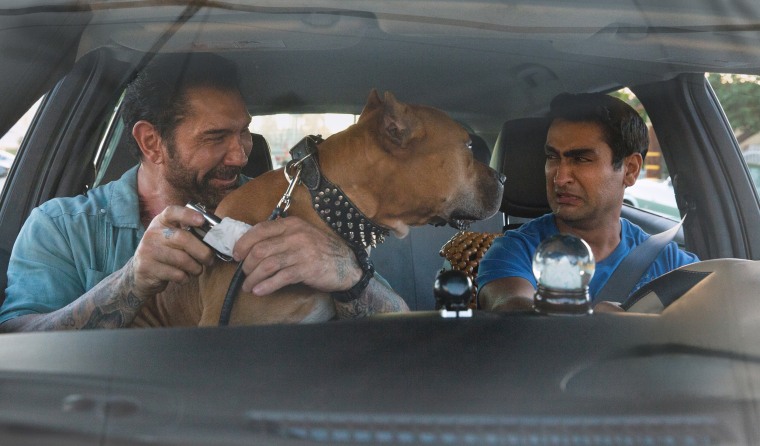“Stuber” is a generic action/comedy buddy movie that is neither very funny nor suspenseful. Like many other films in the genre, the two main characters have different approaches to being a man, which they try to reconcile over the course of the run time. “Stuber's” twist is that these anxieties about masculinity are linked to the new service gig economy. While otherwise mediocre, “Stuber” inadvertently makes an important point about the intersection of labor and masculinity in modern capitalist society.
The film predictably starts with a tragic death. Rugged cop Vic Manning (Dave Bautista) swears revenge on drug trafficker and martial arts expert Oka Teijo (Iko Uwais) after Teijo kills his police partner. After six years, Vic finally gets a solid lead — but unfortunately the tip comes right after he gets Lasik surgery, and his vision is impaired. Unable to see, he hires an Uber driven by Stu (Kumail Nanjiani) to take him to the bad guy's various lairs. Hilarity ensues as Vic stumbles around blindly and Stu screams in fear during standard action movie firefights and car chases.
The subservience required of gig workers infects Stu's whole life; he can't face down his boss, he can't tell his best friend/crush Betty that he loves her.
The central overarching joke of the movie is that Stu is reluctant to dump Vic and just drive away because he wants Vic to give him a good driver rating on the app. Stu's financial situation is precarious; he works at a big box store during the day and drives for Uber on nights and weekends to supplement his hours. He has to be nice to everyone who gets in his car, or he loses income. The subservience required of gig workers infects Stu's whole life; he can't face down his boss, he can't tell his best friend/crush Betty that he loves her.
Stu's Uber emasculation is contrasted with Vic's reactionary violence. The huge cop lurches angrily across L.A., conducting illegal searches, torturing people of color and leaving piles of dead bodies behind him. This is half presented as a joke, and half presented as justified because the victims are all bad guys who supposedly sell heroin to kids.
It's significant that Vic doesn't really know how to use the Uber app. He offers a throwback form of masculinity, both in his retro war on drugs crusade, and in his relationship to his job. The U.S. has deindustrialized, but it's also poured billions into law enforcement. The result is that today the iconic blue collar hero isn't a factory worker or a coal miner, he’s a cop. From John McClane to Vic, the working-class guy in Hollywood is a hard-working policeman who puts his blood, sweat and tears into a dangerous but necessary job. Law enforcement is real, honest empowering labor — not least because it gives men the power to humiliate, injure and kill other people. In contrast, the movie suggests, driving an Uber is a more trivial occupation.
Buddy movies of this genre usually resolve with both men learning from each other and becoming better people. Thus in Edgar Wright's wonderful genre parody/tribute “Hot Fuzz,” the hapless, nice-guy rural cop learns to be more of a badass, while the obsessive, workaholic London cop learns the value of friendship.
Want more articles like this? Sign up for the THINK newsletter to get updates on the week's most important cultural analysis
“Stuber” dutifully reproduces that dynamic. Stu becomes more of a man by shooting people and getting his ride lease into car accidents. Vic becomes more open emotionally because of his relationship with Stu, and reconciles with his daughter.
This emotional progression, though, is accomplished by studiously ignoring the actual labor and financial issues that cause Stu's problems. “Stuber” sees driving an Uber as disempowering and humiliating, but it doesn't criticize the treatment of service workers a la "Sorry to Bother You." Nor does it expand on the tyranny of linking income to personal branding, as in Black Mirror's "Nosedive" episode. Stu doesn't try to unionize; he doesn't even question a system which values his life less than good customer feedback.
The film is also careful to defuse any possible questions about the job of law enforcement. As depicted in many cop shows, the force has bad apples. But the good cops are noble and awesome no matter what rules they break or how many supposedly bad guys they murder. When Stu, who is South Asian, points out that Vic is terrorizing people of color, Vic responds by asserting that he's not white (Bautista is part Filipino.) Vic and Stu go back and forth joking about that, rather than acknowledging that Vic does in fact spend most of the film beating the crap out of black and brown folks. The specter of Black Lives Matter is raised only to be dismissed and turned into a punchline.
Ultimately, the movie is about how a man’s sense of self-worth is connected to his labor. That connection can make men vulnerable and exploitable, in Stu's case, or dangerous to everyone around them, in Vic's. But the film adamantly refuses to talk about or confront the ways in which these jobs might be unjust or contribute to injustice. Work in “Stuber” defines men; Stu's nickname is literally his job. But the conditions of that work are immutable and unquestionable. Capitalism makes the rules; Stu just drives where it tells him.

